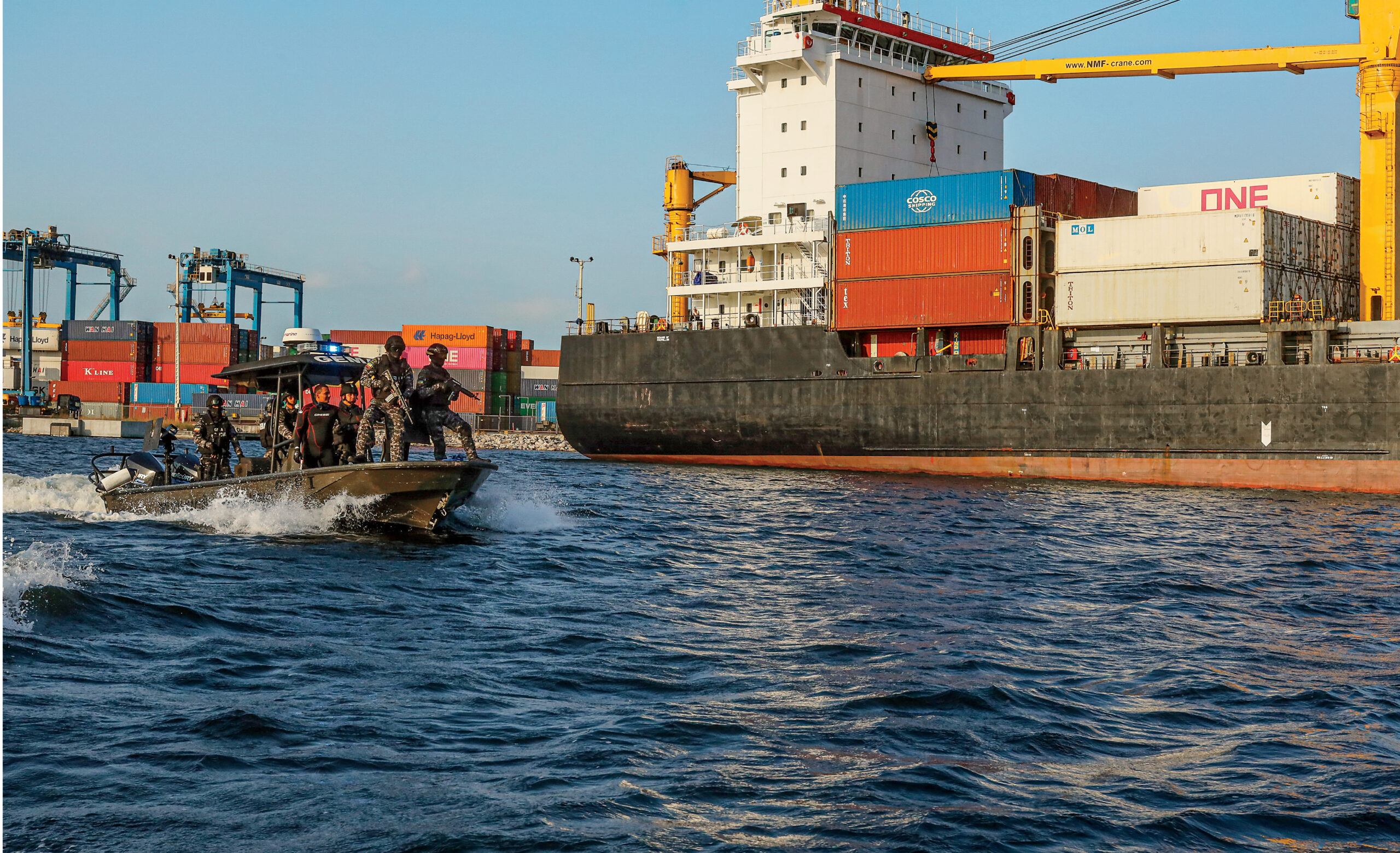Commerce Secretary Carlos M. Gutierrez on Trade in the Western Hemisphere
Commerce Secretary Carlos M. Gutierrez on Trade in the Western Hemisphere
Secretary of Commerce Carlos M. Gutierrez, speaking at the James A. Baker Institute for Public Policy, discussed the importance of trade to the U.S. economy. He also spoke about free trade in the Americas, saying rejection of a free-trade agreement with Colombia "would be not just a step backwards, but one of the biggest foreign policy mistakes of our time in our region."
***AS PREPARED FOR DELIVERY***
Friday, November 30, 2007
Remarks at James A. Baker III Institute for Public Policy
Houston, Texas
Thank you, Secretary Mosbacher for your support of this institute and your service to the country. Your continuing efforts to encourage understanding of issues critical to our nation and the world’s prosperity are vital.
This institute represents a continuation of the public service of Secretary Baker, whose legacy continues to influence the nation particularly through the learning and leadership taking place here at Rice.
Actually, many people don’t know this, but in addition to Secretary Mosbacher and me, Secretary Baker also served at the Department of Commerce where he was briefly Acting Secretary under President Ford. I’m proud to have that public service in common with these two great men, and to be able to contribute to your discussion today.
Let me also acknowledge Mayor Bill White who is with us.
Thank you for your leadership, Mayor.
Let me start today by talking about the strength of the U.S. economy and trade—the single largest factor driving our growth. Listen to these numbers:
- We’ve had 50 months of job growth;
- A 4.9 percent annual increase in GDP last quarter;
- A 12.7 percent rise in per capita personal income since President Bush took office;
- And exports grew 12.7 percent last year to a record $1.4 trillion. This year we’ll beat that with continued double-digit growth;
Nearly a quarter of U.S. GDP growth last quarter was attributable to trade, making trade a driving force in our nation’s economy. There are few places in this country where the impact of international trade has been greater than in Texas and in Houston specifically.
- Exports from Texas are up more than 50 percent since 2003,
- Trade with Mexico last year topped $330 billion. Much of that trade has come through Texas.
- Houston’s port has become one of the busiest in the country, generating $118 billion of total economic activity in Texas last year;
- And, nearly $40 billion of personal income was generated by jobs related to the Port.
Expanding our relationships with major trading partners will increase Texas exports in areas such as energy, high tech, agriculture and chemicals.
Good trade policy should start in our hemisphere.
The Western Hemisphere has made significant progress economically and politically over the last few decades.
- Growth has averaged nearly four percent in recent years;
- Exports from the region’s countries are up over 200 percent since 1990, and totaled more than $2 trillion last year;
- Inflation has come down dramatically, averaging about four percent since the late 1990s; and
- Today overwhelmingly the countries of the Americas have leaders elected by their citizens.
Over the past 20 years, our engagement with our regional neighbors has steadily increased. President Reagan articulated the direction we needed to pursue when he said,
“Our goal must be a day when the free flow of trade, from the tip of Tierra del Fuego to the Arctic Circle, unites the people of the Western Hemisphere in a bond of mutually beneficial exchange.”
The first step in that process was the North American Free Trade Agreement. NAFTA received bipartisan support from both the first Bush Administration—particularly Secretary Mosbacher—and President Clinton.
The question is often asked—has NAFTA succeeded? The answer is yes. Again, let’s take a look at the numbers that show economic progress since NAFTA went into effect:
- Trade among the NAFTA nations has increased more than 200 percent, from $297 billion in 1993, to more than $900 billion this year.
- Unemployment has dropped in all three countries. In the U.S. employment was 112 million and the unemployment rate was 6.6 percent. Now 138 million Americans are working and unemployment is 4.7 percent.
- Incomes in all three countries have increased. Real disposable personal income per capita in the U.S. is up 35 percent since NAFTA.
- And real GDP in the US has grown by an average of 3.1 percent per year since NAFTA came into effect.
The Bush Administration has continued the push for FTAs because they are one of the most powerful tools to enhance stability, security and prosperity in our hemisphere.
When this Administration began we had no FTAs in South and Central America. Today there are seven, and in each and every case, we’ve seen our exports increase and a rise in overall trade flows.
Our first FTA in South America, Chile, is a good example.
Chile’s trade with the U.S. increased over 150 percent between 2003, the year before the FTA, and last year. That’s faster growth than with any Pacific Rim country, including China.
At the same time, the Economist magazine noted that poverty has fallen further and faster in Chile than anywhere else in Latin America.
The article’s title is telling: “Adiós to poverty, hola to consumption.” It describes the development of a broad, lower middle-class that can be both stable and sustainable.
FTAs drive good governance, transparency and respect for the rule of law—all hallmarks of stable societies.
Not only are these prerequisites for prosperity, growth and social justice, they also represent the fulfillment of key objectives of American foreign policy.
There are three FTAs now pending in Latin America: Peru, Colombia and Panama. Colombia is particularly important.
The U.S. contributed more than $5.5 billion to Plan Colombia, an initiative launched under President Clinton to promote the peace process, combat the narcotics industry, revive the economy and strengthen democracy. And it is working:
- Colombia’s a partner in the global war on terror. They’ve courageously stood up to narcotics traffickers and guerillas;
- Since 2000, kidnappings are down 76 percent, terror attacks by 61 percent, and homicides by 40 percent;
- Tens of thousands of paramilitaries have demobilized and have rejoined mainstream society;
- Since 2002, the economy has grown an average of 5.2 percent every year, poverty has been reduced by 10 percentage points; and
- Since President Uribe took office enrollment in public schools is up to 92 percent.
All this has taken place while Colombia stayed true to democratic values. For example in this year’s elections the participation by candidates increased 12 percent over 2003, and at the same time voter participation increased 55 percent, with 3.6 million new voters.
But even more is at stake—hemispheric stability and prosperity are tied to Colombia’s success.
To deny Colombia’s FTA would be not just a step backwards, but one of the biggest foreign policy mistakes of our time in our region.
Although the turnaround in Colombia and the progress taking place elsewhere in the hemisphere is impressive, we can’t assume democracy, openness and trade will prevail—it’s not inevitable.
It’s important that we not only consider what will happen if more trade, investment and openness take place—but what could happen if it doesn’t.
In the past, Latin American countries being overrun by guerrilla movements and drug cartels have reacted with dictatorships, martial law and cancelled elections. Colombia has taken a different path, strengthening their democracy, their ties to the U.S., and their economic development.
There are those in the hemisphere that want to take us in a different direction by embracing failed policies of the past. While we seek the empowerment of the individual, they seek to suppress people, ideas and debate. Our ideas are supported by the force of free markets, while theirs are maintained by the force of arms.
We simply cannot allow—or afford—failure.
While we are pleased with the strong bipartisan vote in the House of Representatives on the Peru FTA earlier this month, it’s imperative that all these FTAs are passed as quickly as possible.
We must make it clear that a stronger, more peaceful and prosperous Colombia is in the best interest of Colombia, of Latin America and of the United States. We must continue to make the case that greater trade and investment is the right direction for the entire hemisphere, from Canada to Chile.
This Administration is committed to passing these agreements and spreading social justice, security and prosperity. The world is changing fast, and we must change with it.
As President Bush said when he hosted the White House Conference on the Americas this summer, our objective is “a healthy, educated and prosperous neighborhood. It's in our interests. America does better when people in the neighborhood in which we live are feeling better…and are making more money. Prosperity is…essential to a peaceful community around us.”
We believe that the policies we’ve promoted, especially free trade agreements, will help communities and countries around the hemisphere take advantage of an increasingly interconnected and interdependent global economy.
By doing so we’ve made tremendous progress over the past 20 years. By expanding those relationships just imagine where this hemisphere might be 20 years from now.
Thank you for listening. I’m looking forward to the discussion panel after lunch.







